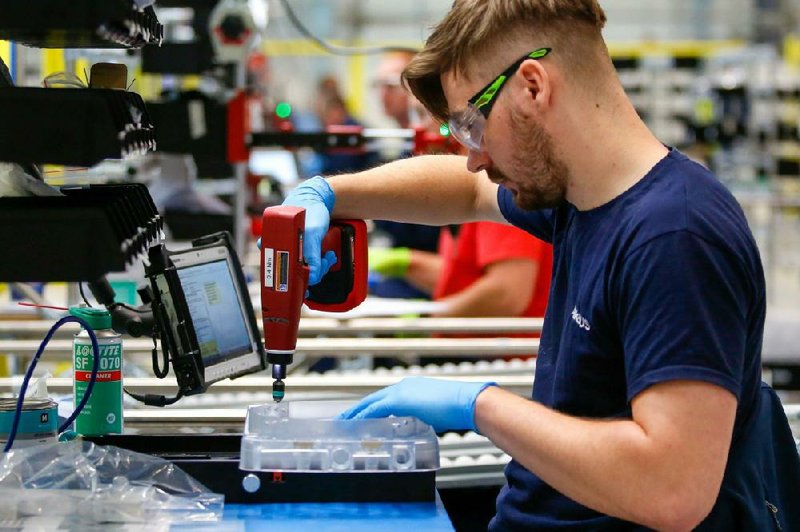Laura Green's job at Airbus's plant in north Wales involved crawling into the wing of an A330 jetliner to fit hydraulic pipes and fuel sensors. That was until a few weeks ago.
With Britain in the grip of the coronavirus, she's now among 550 staff who work 11-hour shifts assembling lung ventilators as part of a government initiative to boost supplies of equipment for the health system.
Bloomberg was given access to the Airbus plant at Broughton recently to see how the company is adapting its processes during the pandemic. While the political narrative has switched to what industries will look like once they emerge from the economically crippling lockdown, Green's job swap illustrates how manufacturing has been turned on its head by covid-19.
Green churns out the life-saving machines in a hangar previously devoted to developing the next generation of aircraft wings. Across the site, 3,200 of her Airbus colleagues, more than half the 6,000 workforce, are being furloughed as the world's No. 1 plane producer faces up to reduced jet demand. Another 1,500 workers were laid off last week at a factory near the city of Bristol, with uncertainty over when and how many will come back.
[CORONAVIRUS: Click here for our complete coverage » arkansasonline.com/coronavirus]
Britain had only 5,000 ventilators available at the start of March and the government didn't join a European Union procurement plan, instead issuing an appeal to industry idled by the lockdown to switch production to the devices.
Despite a confused start and claims that offers of expertise weren't being acknowledged, companies across the country are now involved, spanning Ford Motor Co. to engineering giant Siemens. On April 30, Prime Minister Boris Johnson declared the country was past the peak of its outbreak, though in the absence of a vaccine attention is turning to whether there will be a second wave of infection down the line. With 32,000 suspected deaths, the U.K. is now the worst-hit country in Europe.
Green, 23, joined Airbus as an apprentice four years ago. She said the switch has given her a way to contribute to the fight against covid-19 and hold her head high among relatives who work in Britain's National Health Service.
"It's very different from my day to day work," she said while taking a break from assembling flow-meters that control the ventilator's oxygen supply. "But there are things the two have in common. You have to have the highest standards of quality control, because lives are at stake."
Applications to join the ventilator team were oversubscribed two-to-one, according to Martin Bolton, who was seconded from the wing-research program to run the project.
While aircraft factories are precisely planned, the Airbus ventilator operation takes things to another level, with Siemens digitally designing every inch of the shop floor to ensure social distancing. Workers enter via a sanitization tent and must maintain a two-meter gap everywhere in the complex. The canteen resembles a college examination hall, with people sat at widely spaced desks.
Ventilator assembly also follows a step-by-step process devised by Siemens to allow engineers new to the machines --albeit very skilled ones -- to undertake the work. It takes Green 25 minutes to assemble air and oxygen pipes, compared with typically days spent outfitting a wing.
The Ventilator Challenge U.K. consortium, of which Airbus is a member, is due to produce 15,000 of the medical devices over 10 weeks under a government contract worth $125 million.
Airbus makes both the flow-meter and carbon-dioxide absorber, with Ford's Dagenham engine plant producing the display screen and ventilator box, which pumps air in. Supercar and Formula 1 racing group McLaren is responsible for the trolley into which the other assemblies fit, as well as testing equipment.
Manufacturers are working on the project at cost, meaning none will make a profit, other than medical-equipment specialist Penlon Ltd., which came up with the design based on machines that usually pump anesthetic into patients.
Components are sent to electronics specialist STI Ltd. before Penlon undertakes final testing and the machines are shipped to hospital intensive care units. A second group including Rolls-Royce Holdings and GKN Aerospace is making 5,000 paramedic ventilators designed by Smiths Group. The ventilator initiatives currently employ 3,000 people across the U.K., with Airbus the biggest site.
The cooperation between companies, with several headquartered abroad, has been unparalleled, said Dick Elsy, a former Jaguar Land Rover engineer and head of the U.K.'s manufacturing research centers initiative who leads the consortium. Eighteen months of development work has been crammed into four or five weeks.
While it's unlikely all the devices will be used immediately, the effort has been crucial in boosting the country's resilience to the pandemic and potential future outbreaks, Elsy said at the Broughton plant.
Across the factory floor from Green, Steve Morris, 33, is working on the ventilator's absorber assembly. In his day job, Morris, who said members of his family are self-isolating against the virus, drills holes in the 15-meter-long (49-foot) bottom skin of an Airbus A320 narrow-body jet wing.
"There's quite a size difference," he said. "Compared with a wing, it's a bit more fiddly. But it's great to be a part of it."
SundayMonday Business on 05/10/2020
